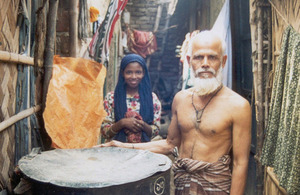DFID Research: promoting composting as a business for the urban poor
Recycling organic wastes is good for livelihoods and health.

Urban composting. Picture: Jonathan Rouse/WEDC
Dealing with increasing quantities of urban solid waste is a major challenge for urban planners and managers worldwide. In low income countries, inorganic waste such as metals and glass is often recycled by the informal sector, while non-governmental organisations and the private sector take a lead in recycling organic waste through composting. However, resources to remove the organic portion of waste (often more than 50% of the total waste by weight) are in short supply and little attention is paid to the economic and environmental benefits of involving the urban poor in recycling organic waste. Frequently, a failure to collect this organic waste leads to unpleasant and hazardous city conditions (as decomposing waste can be a serious health hazard).
This novel DFID-supported research focused on involving the urban poor in recycling of organic waste through sustainable composting. It promoted composting as a business in order to enhance income and improve the health and environment of the urban poor. While many projects have looked into the technological aspects of producing compost, this project focused on field testing new approaches and developing guidelines (including marketing and sales guidelines) for composting businesses that benefit the urban poor.
Main research lessons are:
- the urban poor can benefit from long-term organic waste composting that creates sustainable employment and provides extra income
- to increase the sale of this compost, a business perspective (including demand and marketing analysis) is needed. Good planning and an understanding of the lessons learned from previous experience is also useful
- local authorities should be encouraged to accept and support compost schemes. Apart from land provision, they could also assist with training, community education, collecting un-recyclable waste and buy-back arrangements
- community awareness of the potential economic and environmental benefits should to be raised. Residents need to be mobilised to co-operate in composting schemes
The project has encouraged interest in piloting sustainable compost projects for the urban poor in Bangladesh, Sri Lanka and Pakistan. In addition, a number of organisations (for example Dhaka City Corporation, Water and Sanitation Programme) have used the guidelines to more realistically plan and monitor sustainable compost projects.